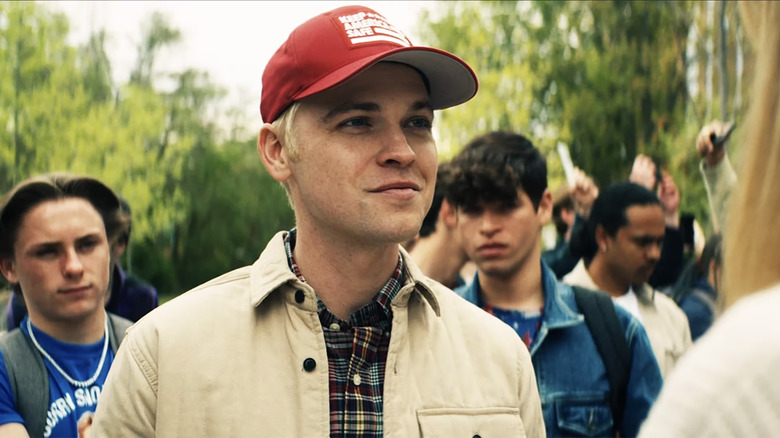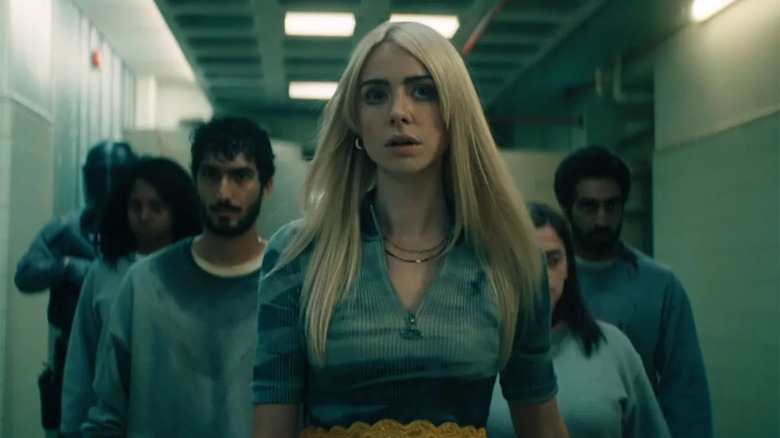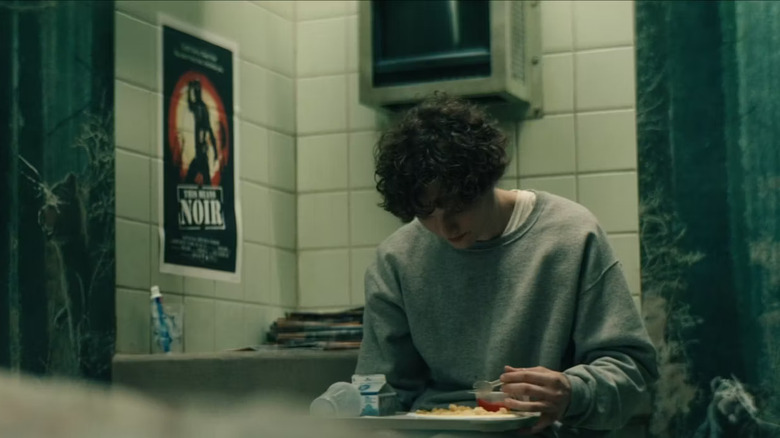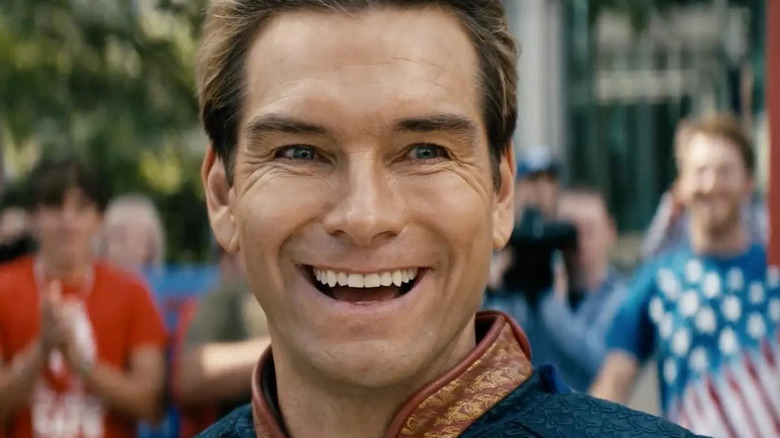Gen V Shows The Ease Of Radicalization By The Alt-Right
This post contains spoilers for the season 1 finale of "Gen V."
"The Boys" has been praised for the way showrunner Eric Kripke and the rest of the writers' room have successfully adapted Garth Ennis and Darick Robertson's popular comic book series to more accurately reflect our constantly shifting cultural landscape. Many of the plot points and references are pulled straight from the headlines, with promises that the upcoming season 4 will directly tackle even more real-world themes. Considering season 3 ended with Homelander literally living out the claim of the twice-impeached, found legally liable for sexual abuse and defamation, and feloniously indicted former president Trump's statement "I could stand in the middle of 5th Avenue and shoot somebody and I wouldn't lose voters," it certainly seems like the show is heading toward dissecting not only the people who will do anything to stop him but also those who have been dangerously radicalized by his actions.
And the first season of "Gen V" — especially the final two episodes — is already laying that groundwork.
There has been so much to love about "Gen V" thus far, and rightfully so. It's not often that a spin-off show can match the caliber of the original, let alone strengthen the flagship series in hindsight. But that's precisely what "Gen V" does. For the past three seasons, fans have watched as the Nazi-founded Vought International and its industry of Supes tighten its stranglehold on America while citizens worship at the altar of Homelander, a complex "hero" who borders on sociopathy. But how does a figure like that — with such blatantly obvious evil behind his piercing blue eyes and perfectly shaped smile — come to such prominence? Well, the answer lies in "Gen V," just as we can look to the same demographic of people in America to see how it happens in our own lives.
The complicity of white feminism in Cate
White women are marginalized by our gender identity but an upsetting number of us cling to our proximity to white supremacy with well-manicured hands. Despite Cate Dunlap's experience of being taken advantage of by the systems meant to take care of her, she is gladly "girlbossing" her way to a position of power by acting in the same manner as her oppressors. People foolishly believe that because white women are under the thumb of the patriarchy they're more likely to be progressive thinkers, but that simply isn't true. The majority of white women voted for Trump in the 2020 election and as Salon rightfully pointed out in their 2022 article exploring white women and fascism:
"White women played a key role in planning and organizing the Trump regime's coup attempt and the attack on the Capitol on Jan. 6. White women were also strikingly visible among the attackers. To wit: A white woman became the only person directly killed by police that day, and has now been elevated into a martyr for the American neofascist cause."
This is all playing out with Cate on "Gen V." She knows better. She's seen firsthand what the powers that be are capable of and, rather than fight for a more just world, she's looking to run to the top of the ladder by any means necessary. After Dean Shetty slits her own throat, Cate prevents Marie from saving her life. Saving her would be the right thing to do, but Sam calls it "justice," to which Cate agrees. And it's hard not to see their perspective, as Dean Shetty legitimately wants to wipe out all Supes. After Shetty's death, Cate says, "I'm being a hero," and Sam replies, "I want to be a hero, too." Cate positions herself as a hero for avoiding martyrdom, and Sam falls into the trap.
Proud boys like Sam
Sam is a Supe treated like a glorified lab rat for scientific experimentation and is still mourning the death of his brother, Luke. He's mentally unwell, emotionally exposed, and prone to violent outbursts. At the same time, he's also got a great sense of humor, a huge heart, and has more than proven he has the capacity for healthy relationships. And yet it only took a few hours hanging around with other teenage Supes on a dorm floor for Sam to immediately become radicalized by fascists-in-training like Rufus, who use their superpowers to commit atrocities because they believe they're "better" than average humans. How did this happen? How did Sam turn so quickly?
The answer lies in the same conversations surrounding Proud Boys, QAnon, Men's Rights Activists, neo-nazis, Andrew Tate followers, and other radical hate groups — they target isolated, vulnerable, and impressionable young men. The quarantine era of the pandemic only exacerbated things, because the time young men spent online and isolated from their peers only intensified, making them even more susceptible to the influences of men they perceive to be better, stronger, smarter, or simply more "manly." We see this play out in the film "American History X," where the Vinyard brothers are radicalized in their youth by white supremacists because they feel threatened by changes in their environment.
There is no singular pathway to extremism, and this article cannot fully encapsulate the various ways people give themselves over to fascism. But in the case of Sam, he's a scared kid from terrible circumstances looking for answers. People like Rufus make him not only feel heard, but powerful. In a white supremacist, patriarchal society, telling someone who has only ever felt weak that they are deserving and even entitled to that power is a drug unlike any other.
The influence of a leadership figure like Homelander
At the end of the finale, a news report shows photos of Sam and Cate, two white, blonde Supes presented as the new "Guardians of Godolkin," with the sign-off that these two are "protecting us, our values, and our way of life." Who is "us" in this situation if not the white supremacist status quo? This announcement is made after Homelander flies onto campus and neutralizes Marie, Jordan, Andre, and Emma to keep them in solitary isolation. Before attacking, he calls Marie an "animal," a racist expression historically used against Black people.
Homelander is currently "mask off" as a fascist, and as /Film's own Dani Ryan pointed out in a phenomenal piece analyzing his character, he is representative of "the violent, misogynistic, hateful white supremacist men [who] are a small percentage of the population," but correctly identified that "by being angry, violent, and bigoted publicly, he gives others permission to do the same, and that's a terrifying proposition that's all too real." With Homelander killing people who disagree with him in public to uproarious applause, it's no wonder that Sam and Cate are now thriving.
"The Boys" and "Gen V" showrunner Eric Kripke has already confirmed that season 4 of "The Boys" is going to pick up where "Gen V" left off, and that season 2 of "Gen V" will pick up after the events of "The Boys" season 4. As much as "Gen V" is a spin-off, it's still the same universe, and the stories impacting these characters are all interconnected with those on "The Boys." Ignoring what is happening in one area of society in this universe is foolish because what impacts one group will eventually impact them all ... just as it does in our real world.



